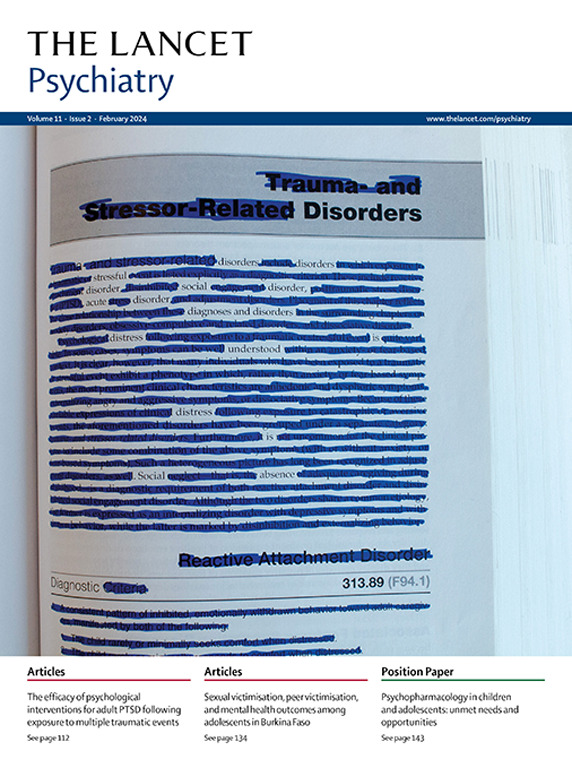Efficacy and safety of semaglutide versus placebo for people with schizophrenia on clozapine with obesity (COaST): a phase 2, multi-centre, participant and investigator- blinded, randomised controlled trial in Australia
IF 30.8
1区 医学
Q1 PSYCHIATRY
引用次数: 0
Abstract
Background
People with schizophrenia have a 16–20-year reduction in life expectancy, primarily due to cardiometabolic disease. Clozapine, the most efficacious antipsychotic for treatment-resistant schizophrenia, is associated with weight gain and metabolic dysfunction. Glucagon-like peptide-1 receptor agonists, including semaglutide, contribute to substantial weight loss in the general population, but their effect and safety profile in people with schizophrenia remain unknown. We evaluated the efficacy and safety of semaglutide for weight reduction in individuals with schizophrenia who were prescribed clozapine.Methods
COaST was an Australian randomised, placebo-controlled, multi-site trial, independent of pharmaceutical industry support, with methods informed by people with lived experience. Adults (aged 18–64 years) across six sites were randomly assigned (1:1) to once weekly subcutaneous semaglutide titrated to 2·0 mg or placebo for 36 weeks. Participants were included if they fulfilled criteria for schizophrenia or schizoaffective disorder, were prescribed clozapine for 18 weeks or more, had a BMI of at least 26 kg/m2, and had less than 5% bodyweight increase or loss in the previous 3 months. The primary outcome was percentage body weight change, analysed using a mixed model for repeated measures, at 36 weeks post-baseline assessment. All investigators and participants were masked to medication allocation. Secondary measures included clozapine and norclozapine concentrations and psychosis symptoms as measured by the Positive and Negative Syndrome Scale (PANSS). The protocol was prospectively registered with the Australia New Zealand Clinical Trials Registry (ACTRN12621001539820; recruitment finished, pending follow-up assessments).Findings
166 individuals were screened for eligibility, 135 were excluded, and the remaining 31 were randomly assigned to either the semaglutide group (n=15) or the control group (n=16). 21 males and ten females were included in the study, with a mean age of 38·9 years (range 21–58). All participants assigned to each group were included in the analysis of the primary outcome. 84% of participants were White, 7% were from the Indian Subcontinent, 3% were Asian (not including from the Indian Subcontinent), 3% were Australian Aboriginal or Torres Strait Islanders, and 3% were New Zealand Māori or Pacific Islanders. Recruitment commenced on Aug 30, 2022 and was suspended in June, 2024 before achieving the intended number of 80 participants due to non-availability of the investigational product. At week 36, semaglutide yielded a 13·88% (SE 0·90) body weight reduction compared with 0·42% (SE 0·93) for placebo (between-group difference: –13·46%; p<0·0001). No differences were observed in clozapine or norclozapine concentrations or PANSS scores. Semaglutide was well tolerated, with no serious adverse events that were deemed to be related to the treatment, and low rates of constipation.Interpretation
Semaglutide led to significantly greater weight loss than placebo in this small trial without affecting psychotic symptoms or clozapine concentrations. Semaglutide appears to be safe and well tolerated in this population. These encouraging findings highlight the need for larger confirmatory trials.Funding
National Health and Medical Research Council, Qld Advancing Clinical Research Fellowship, and Metro South Health Research Support Scheme Program.西马鲁肽与安慰剂对氯氮平合并肥胖精神分裂症患者的疗效和安全性(COaST):澳大利亚一项2期、多中心、参与者和研究者盲法、随机对照试验
精神分裂症患者的预期寿命减少16 - 20年,主要是由于心脏代谢疾病。氯氮平是治疗难治性精神分裂症最有效的抗精神病药物,但与体重增加和代谢功能障碍有关。胰高血糖素样肽-1受体激动剂,包括西马鲁肽,在一般人群中有助于大幅度减肥,但其在精神分裂症患者中的效果和安全性尚不清楚。我们评估了西马鲁肽对服用氯氮平的精神分裂症患者减肥的有效性和安全性。方法scoast是一项澳大利亚随机、安慰剂对照、多地点试验,独立于制药行业支持,方法由有生活经验的人告知。6个地点的成年人(18-64岁)随机分配(1:1),每周1次皮下注射西马鲁肽,滴至2.0 mg或安慰剂,持续36周。如果参与者符合精神分裂症或分裂情感性障碍的标准,服用氯氮平18周或更长时间,BMI至少为26 kg/m2,并且在过去3个月内体重增加或减少少于5%,则纳入研究。主要结果是体重变化百分比,在基线后36周评估时使用重复测量的混合模型进行分析。所有调查人员和参与者都不知道药物分配情况。次要测量包括氯氮平和去氯氮平浓度以及用阳性和阴性综合征量表(PANSS)测量的精神病症状。该方案已在澳大利亚新西兰临床试验注册中心前瞻性注册(ACTRN12621001539820;招聘结束,等待后续评估)。166人被筛选为合格,135人被排除,其余31人被随机分配到semaglutide组(n=15)或对照组(n=16)。男性21例,女性10例,平均年龄38.9岁(21 ~ 58岁)。所有被分配到每一组的参与者都被纳入了主要结果的分析。84%的参与者是白人,7%来自印度次大陆,3%是亚洲人(不包括来自印度次大陆),3%是澳大利亚原住民或托雷斯海峡岛民,3%是新西兰Māori或太平洋岛民。招募于2022年8月30日开始,由于无法获得研究产品,在达到预期的80名参与者数量之前,于2024年6月暂停。在第36周,西马鲁肽使体重减轻了13.88% (SE 0.90),而安慰剂的体重减轻了0.42% (SE 0.93)(组间差异:- 13.46%;术;0·0001)。氯氮平或去氯氮平浓度或PANSS评分均无差异。Semaglutide耐受性良好,没有被认为与治疗相关的严重不良事件,便秘率低。解释:在这项小型试验中,在不影响精神病症状或氯氮平浓度的情况下,semaglutide导致的体重减轻明显大于安慰剂。在这一人群中,西马鲁肽似乎是安全且耐受性良好的。这些令人鼓舞的发现强调需要进行更大规模的验证性试验。资助国家卫生和医学研究委员会,昆士兰州推进临床研究奖学金,以及南方地铁卫生研究支持计划项目。
本文章由计算机程序翻译,如有差异,请以英文原文为准。
求助全文
约1分钟内获得全文
求助全文
来源期刊

Lancet Psychiatry
PSYCHIATRY-
CiteScore
58.30
自引率
0.90%
发文量
0
期刊介绍:
The Lancet Psychiatry is a globally renowned and trusted resource for groundbreaking research in the field of psychiatry. We specialize in publishing original studies that contribute to transforming and shedding light on important aspects of psychiatric practice. Our comprehensive coverage extends to diverse topics including psychopharmacology, psychotherapy, and psychosocial approaches that address psychiatric disorders throughout the lifespan. We aim to channel innovative treatments and examine the biological research that forms the foundation of such advancements. Our journal also explores novel service delivery methods and promotes fresh perspectives on mental illness, emphasizing the significant contributions of social psychiatry.
 求助内容:
求助内容: 应助结果提醒方式:
应助结果提醒方式:


